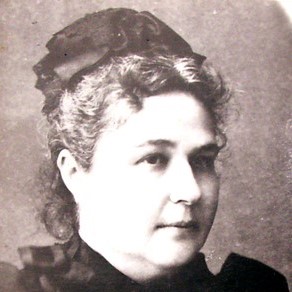 |
Date of Birth | 1841-11-10 | |||
| Place of Birth | Warszawa | ||||
| Date of Death | 1911-01-19 | ||||
| Place of Death | Piotrowice | ||||
| Familiar ties | Daughter - Faustyna Morzycka | ||||
| VIAF ID | 68150868152122070829 | ||||
|
Public Domain: |
Maria Obuchowska-Morzycka was the mother of Faustyna Morzycka and the author of a truly priceless autobiography, whose original manuscript can be found in Muzeum Stefana Żeromskiego w Nałęczowie (Museum of Stefan Żeromski in Nałęczów).
Obuchowska-Morzycka was born in Warsaw on November 10th, 1841. She writes in her diary: “On the corner of Mazowiecka and Świętokrzyska, in the townhouses which seemed to me to be the property of doctor Malon”. Her father was a road and communications engineer who received his education in Petersburg through the Cadet Corps. He was well educated, enjoyed poetry, wrote poems, and liked music. On the other hand, her mother was from the Lasocka household, and “was known for her beauty and kindness (...), raised by her grandmother, an elderly lady who lived in the times of Stanisław Poniatowski’s reign”. Obuchowska-Morzycka came from quite a wealthy family which held education in high regard, put great emphasis on schooling, tended to their childrens’ spiritual and intellectual development, and put material things at a lower priority. They only purchased necessary things for the family, or for tending their land. From an early age, she learned to play the piano, enjoyed telling stories, and read ambitious books such as Żyd wieczny tułacz (The Eternally Wandering Jew), Konrad Wallenrod, and Tajemnice Paryża (The Secrets of Paris). In the home she was considered her father’s favorite, which is why she was often asked for help and rescue in difficult and complicated situations. Around the year 1848, the family moved to Międzyrzec, and Obuchowska-Morzycka ended up in a private girls’ school in Warsaw in 1852. In 1857, she married Julian Morzycki at 16 years old. She writes: “My fiance was nearly 40 years old”, and “the wedding was old-fashioned, in the traditional Swedish style, with a folk band, hundreds of relatives, and close friends who never felt an inkling of friendly feelings toward our home”. The Morzycki family had many children: Rozalia Maria Paulina, Julia Maria Paulina, Maria Paulina Katarzyna, Paulina, Faustyna, Wacława and Jan. On September 2nd, 1863, her husband was recognized as a political criminal for participating in the Wołyn uprising, and was sentenced to 20 years of hard labor in Siberia. Obuchowska-Morzycka accompanied him on the road to the Usolsky district in the Irkutsk Oblast, where they were both placed in hard labor. Returning to Poland from Siberia, she decided that she would leave her husband, claiming that the 14 years spent together was a waste of time. She ended up back In Petersburg, where she attempted to ask the Tsar to pardon her husband. There, she met the lawyer Marcin Wroński. She abandoned her family (husband and children) for Marcin, and to have a son and daughter with him. However, she never officially got a divorce from Julian. As a member of the protestant faith, she was reportedly buried in a cemetery in Lublin.
WORKS
Obuchowska-Morzycka M., Pamiętniki, [W:] Klijanienko-Pieńkowski J., Pan Pieńkowski ? Da, oni zili zdieś… Wołyń, Syberia, Nałęczów, losy ziemiaństwa na podstawie dokumentów rodzinnych, Stalowa Wola, Wydawnictwo Sztafeta, 2012, s. 86–422.
BIBLIOGRAPHY
Caban W., Michalska-Bracha L., Marii Morzyckiej-Obuchowskiej podróż do syberyjskiej Arkadii, [In:] Podróże na przestrzeni dziejów, ed. B. Wojciechowska, Kielce, Wydawnictwo Uniwersytetu Jana Kochanowskiego, 2015, s. 71-87.
Cedro W., Droga na Syberię polskich kobiet na przykładzie Ewy Felińskiej, Marii Morzyckiej i Jadwigi Prendowskiej, "Studia z Historii Społeczno-Gospodarczej XIX i XX Wieku", T. 17 (2017), s. 145-154. DOI: 10.18778/2080-8313.17.10
Cedro W., Droga na zesłanie polskich kobiet razem z dziećmi po Powstaniu Styczniowym.Droga na zesłanie polskich kobiet razem z dziećmi po Powstaniu Styczniowym. [In:] Studia z historii gospodarczej, kulturowej i społecznej, ed. P. Budzyński, M. Dawczyk, i in., Łódź „Vade Nobiscum”, 2019, t. 21, s.51-62.
Cedro W., Opis drogi na zesłanie Jadwigi Prendowskiej i Marii Morzyckiej-Obuchowskiej, [In:] Język jako świadectwo kultury: język, kultura, społeczeństwo, Kielce, Instytut Filologii Polskiej Uniwesytetu Jana Kochanowskiego, 2017, s. 51-59.
Gabryś-Sławińska M., Punkty zwrotne w pamiętnikarskich zapisach Marii z Obuchowskich Morzyckiej. „Biografistyka Pedagogiczna”. 2024, T. 9, nr 2, s. 233–250. DOI: 10.36578/BP.2024.09.44
Klijanienko-Pieńkowski J., Pan Pieńkowski ? Da, oni zili zdieś… Wołyń, Syberia, Nałęczów, losy ziemiaństwa na podstawie dokumentów rodzinnych, Stalowa Wola, Wydawnictwo Sztafeta, 2012.
Michalska-Bracha L., “Polish Women in Exile to Siberia in the 19th Century – Autobiographical Reflection in Women’s Narratives”. "Respectus Philologicus", 2018, vol. 34, no. 39, pp. 97-106, DOI: 10.15388/RESPECTUS.2018.34.39.08
Walęciuk-Dejneka B., Kobiece pisanie - trzy portrety : szkice o mniej znanej (nieznanej) literaturze kobiet przełomu XIX i XX wieku. Cz. 1., Siedlce, Wydawnictwo UwS, 2025. DOI: 10.34739/68355.51.2
Walęciuk-Dejneka B., Samodzielna, odważna, nowoczesna : historia Marii Morzyckiej-Obuchowskiej w świetle wybranych fragmentów jej "Pamiętników", "Czasopismo Naukowe Instytutu Studiów Kobiecych", 2017, [nr] 2, s. 9-22.
Marii Obuchowskiej-Morzyckiej podróż do syberyjskiej Arkadii
Author biography: Beata Walęciuk-Dejneka
This work is licensed under a Creative Commons BY-NC Attribution - NonCommercial 4.0 license. License text





